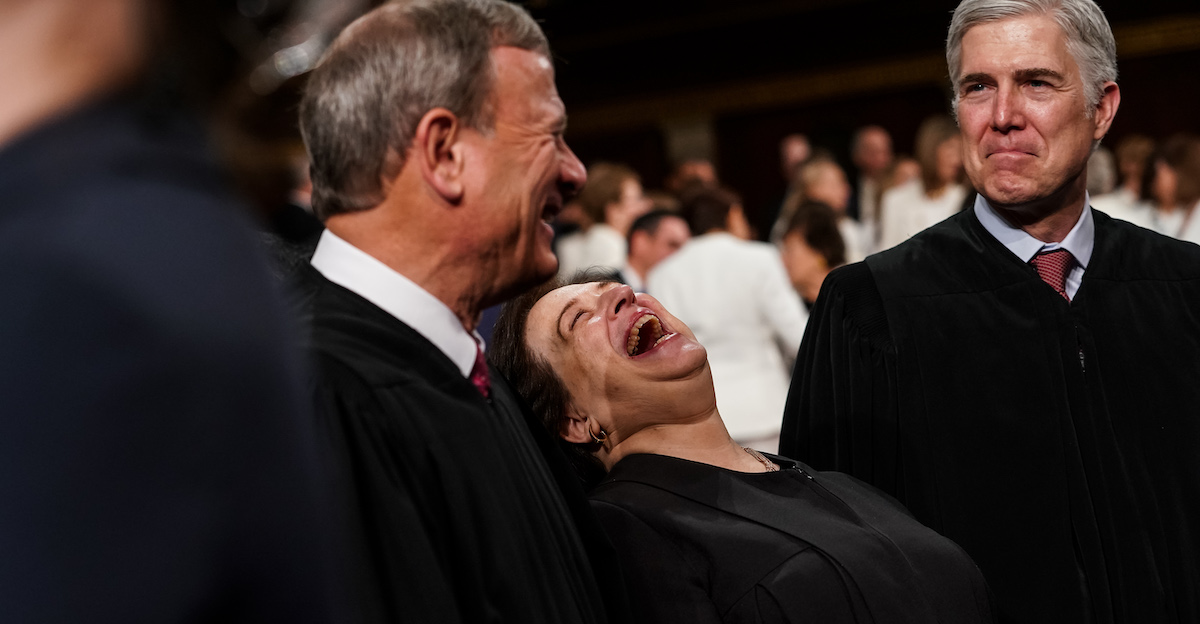
The U.S. Supreme Court rejected a challenge to novel coronavirus (COVID-19) worship restrictions filed by a California church in a brief opinion issued late Friday night.
Conservative Chief Justice John Roberts joined with the court’s legally liberal judges in the 5-4 decision that denied the bid to lift those restrictions filed by San Diego-area South Bay United Pentecostal Church.
California Governor Gavin Newsom, a Democrats, recently put in place “temporary numerical restrictions on public gatherings” to stop the spread of the deadly and unprecedented contagion.
“State guidelines currently limit attendance at places of worship to 25% of building capacity or a maximum of 100 attendees,” Roberts noted in his brief opinion concurring in the decision to deny the evangelical church injunctive relief as the lawsuit makes its way through the legal system. The church typically expects crowds between 200 and 300 individuals to attend worship services.
While a concurrence in the judgment here was not strictly necessary, Roberts went out of his way to rubbish conservatives’ arguments that restrictions on religion are always unconstitutional.
“Although California’s guidelines place restrictions on places of worship, those restrictions appear consistent with the Free Exercise Clause of the First Amendment,” the chief justice observed. “Similar or more severe restrictions apply to comparable secular gatherings, including lectures, concerts, movie showings, spectator sports, and theatrical performances, where large groups of people gather in close proximity for extended periods of time.”
“And the Order exempts or treats more leniently only dissimilar activities, such as operating grocery stores, banks, and laundromats, in which people neither congregate in large groups nor remain in close proximity for extended periods,” Roberts added.
In other words, Roberts noted that Newsom’s restrictions are not religion-specific and broadly apply to all sorts of public gathering spaces in the Golden State. Simply because a religious institution is incidentally challenged by a neutral law does not mean that such a law runs afoul of the First Amendment, the justice held.
Roberts also took the opportunity to goad his more legally conservative colleagues by juxtaposing typical right-wing affection for strong executive authority with their disdain for activist judges:
The precise question of when restrictions on particular social activities should be lifted during the pandemic is a dynamic and fact-intensive matter subject to reasonable disagreement. Our Constitution principally entrusts “[t]he safety and the health of the people” to the politically accountable officials of the States “to guard and protect.” When those officials “undertake[ ] to act in areas fraught with medical and scientific uncertainties,” their latitude “must be especially broad.” Where those broad limits are not exceeded, they should not be subject to second-guessing by an “unelected federal judiciary,” which lacks the background, competence, and expertise to assess public health and is not accountable to the people.
The three-page explanation also stresses the public health emergency.
“At this time, there is no known cure, no effective treatment, and no vaccine,” Roberts notes. “Because people may be infected but asymptomatic, they may unwittingly infect others.”
Justice Brett Kavanaugh, who penned a similarly brief dissent, disagreed with his Republican-appointed colleague.
“California’s 25% occupancy cap on religious worship services indisputably discriminates against religion, and such discrimination violates the First Amendment,” he argues–before citing the language of emergency injunctive requests. “The Church would suffer irreparable harm from not being able to hold services on Pentecost Sunday in a way that comparable secular businesses and persons can conduct their activities.”
Roberts was unconvinced. Again, the chief justice:
[H]ere, officials are actively shaping their response to changing facts on the ground. The notion that it is “indisputably clear” that the Government’s limitations are unconstitutional seems quite improbable.
[image via Doug Mills/The New York Times POOL PHOTO]
Have a tip we should know? [email protected]